
Recently on Cyclingnews.com |
Eurobike show
Germany, August 31-September 3, 2007
Main Page Previous Part Next Part
Part 10 - Aug 31 - Sept 3:
Ultra-style and ultralight go hand in hand
By James Huang
Lazer Helmets dives into urban market
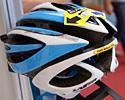
|
Belgium-based Lazer Helmets proudly states that it is the oldest helmet manufacturer worldwide that is still active, and appears to show few signs of slowing down since its inception in 1919. In just the last seven years, Lazer helmets have seized three world championships, an Olympic gold medal, Paris-Roubaix twice, and Liège-Bastogne-Liège.
The top-end Genesis model carries on for 2008 in both road and MTB versions with Lazer's unique Rollsys circumferential fit system, Rigidity Brace System (RBS) internal reinforcement cage, color-matched pads and straps, and the same nineteen-port ventilation system used by Tom Boonen, Paolo Bettini, and the rest of the Quick Step-Innergetic team. Changes are mostly limited to aesthetics, but among the new colorways is a fantastic 'World White Gold' model resplendent in gold accents and hard-earned World Championship stripes.
The mid-priced Blade is revamped to create the Blade 2, which boasts a new shape and better fit courtesy of its Turnfit Pro adjustable retention system. Lazer also introduces the aerodynamic Bullet lid to supplement its existing Chrono 3 model. The Bullet comes equipped with fifteen vents, flexible coverage around the ears, and in-mold construction.
In a distinct departure from its competition-minded helmets, Lazer also displayed its new Urbanize concept intended for style-minded commuters. The casual shape includes an integrated visor, Rollsys retention system, and internal reinforcements. In addition, a proprietary lighting system is designed to snap directly into the front and rear of the helmet for nighttime visibility.
Assos introduces next generation of bib shorts
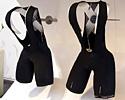
|
Assos is not a company that religiously overhauls its lineup year after year, so any major changes are generally fairly significant. For 2008, Assos revamps its premium F1 line of shorts to yield a new 'S5' generation. Claimed benefits include a 25% reduction in volume and weight and 23% less pressure in 'sensitive' areas, as well as a 35% increase in breathability and 18% more compression in muscle areas, all courtesy of a new 'Type A.430' compression fabric, refined cut patterns, and new insert shapes.
The top-end F1.13 S5 and F1.13 Lady's include an aggressively cycling-specific six-panel cut (think mildly uncomfortable when standing upright but perfect when on the bike) and an asymmetric gripper design. The men's version also incorporates a carbon fiber mesh back panel (carbon fiber?!). The slightly more casual F1.Mille S5 uses a less aggressive four-panel cut and antistatic mesh back panel.
Assos will also introduce its classically-styled and limited edition Six-Days jersey, based on Assos' popular SS.Uno jersey but includes a full spandex shoulder. The Six-Days jersey will be offered in a wide range of bold colors, and each will include a matching cap and pair of socks, as well as a commemorative book. The jersey, cap, and socks will only be available as a complete set, but Assos will offer matching gloves separately.
German firms combine forces to create 3.3kg machine
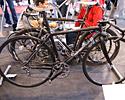
|
Eurobike is always an excellent venue to both display and view ultralight project bikes that easily shatter most people's conceptions of how light a bicycle can be. ProTour team riders may have the UCI's 6.8kg minimum weight ruling on their minds on a regular basis, but one German consumer obviously couldn't care less as his shockingly light 3.35kg (7.39lb) road machine was proudly on display at Eurobike.
The stunning showpiece was built around a German-made Spin custom carbon frame claimed to weigh well under 700g. Other component shockers include a 370g THM carbon crankset (with carbon fiber spindle), a 79g one-piece integrated saddle and post, sub-90g brake levers, and 9g shift levers.
To be fair, we're certainly not sure how well this bike would hold up under typical use, and the owner's claim of budgeting for just 20g of tubular glue doesn't exactly lend worlds of confidence. Other practical issues such as the five-speed straight-block cassette, non-indexed shifting, awfully uncomfortable-looking handlebar bend, and the bike's overall spindly-looking nature also raise serious questions.
Nevertheless, it provides a clear picture of how far the envelope can be pushed. How much further will it go? Wait until next year and see…
Pro bikes on display at Eurobike
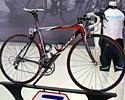
|
A veritable fleet of perfectly 'normal' 6.8kg+ bikes were also on hand in Friedrichshafen this year in the form of various pro riders' machines. Included in the lineup were Gilberto Simoni's Scott Addict, Marianne Vos' Van Tuyl time trial machine, Cadel Evan's Ridley Noah and Erwin Vervecken's Ridley X-Night, and even Floyd Landis' BMC TT01 Time Machine.
Among the most unconventional of the pro machines on display, though, was Thomas Frischknecht's Scott Spark cross-country full-suspension bike. Frischi is well-known to be a certifiable weight weenie and while all of the equipment appeared readily available, there was still obviously a lot of thought put into where grams could be shaved.
Among the most radical component choices was his custom wheelset, which consisted of ultralight Ritchey WCS hubs (which are based on American Classic's design) and carbon fiber tubular rims wrapped in custom Dugast tubulars with actual Ritchey tread patterns.
Ritchey has been a long-time sponsor of Frischknecht, and the WCS world championship stripes also grace the saddle, seatpost head, handlebar, stem, grips, bar ends, crankarms, and pedals. There is no external bearing bottom bracket to be found here, though, as Frischi prefers to run Ritchey's forged aluminum and ISIS-compatible WCS crankset with just two rings and an especially narrow bottom bracket.
How light is the total package? We weren't able to weight it ourselves, but it should suffice to say that it certainly isn't heavy.
What show are we at again?
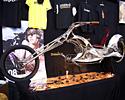
|
Not every bike that was displayed at Eurobike was bred for competition. Commuter and trekking bikes are also popular in the region, but some could easily have come straight out of the North American Handmade Bicycle Show. One particular creation was virtually guaranteed to win the 'heaviest in show' prize and made no apologies for it.
Tucked away in the Tr!ckstuff booth were the works of 'cycloholic' metal artist Oliver Baur, including a gothic-looking chopper and a pair of the most industrial-looking (and fantastically durable) bicycle repair stands we've laid eyes on.
Baur says that most of his raw materials come from metal scrap yards, and the end results typically only begin to take their final form once he ascertains what he has available to work with. For example, the legs of the repair stands spent their past life as part of a hospital bed.
North America-based consumers should expect to pay a hefty shipping fee as Baur is based in Germany, but well-heeled European cycling aficionados with a penchant for something unique owe it to themselves to pay him a visit. More information is available on Baur's web site at www.cycloholic.de.
Photography
For a thumbnail gallery of these images, click here
Images by James Huang/Cyclingnews.com
- Lazer Helmets has been on a roll over the past few years and numerous high-profile wins by Paolo Bettini certainly haven't hurt.
- Lazer's top-end Genesis model in Italian national team livery.
- Tom Boonen, Bettini, and the rest of the Quick Step-Innergetic team will wear this lid next season.
- The Genesis is also offered in a MTB version…
- …and women's as well.
- The unique Lazer Rollsys retention system adjusts via a small knob at the top of the helmet…
- …which tightens or loosens a small cable that wraps around almost the complete circumference of your head for a secure fit.
- The Blade has been updated to yield the new Blade 2.
- The Lazer Magma carries on for 2008…
- …and still includes the very useful winter cover. Select Lazer models will also be offered in the matte white 'Timeless' colorway.
- The new Urbanize concept is strictly aimed at the commuter market with a casual style and integrated visor.
- The front and rear of the Urbanize will accept snap-in lights for nighttime visibility.
- Assos updates its top-end bib shorts for 2008.
- The new 'S5' range includes new fabrics and cuts , and new chamois as well.
- The new chamois material is said to be both more breathable and more comfortable.
- Assos' new Six-Day collection pays homage to the heyday of track racing.
- Commemorative packaging will include a matching cap and socks as well as a hardcover book.
- How much does this bike weigh again? Yup, that's right; just 3.35kg.
- One savvy German consumer spared no expense in achieving the pinnacle of weight weeniedom, including this THM carbon crankset.
- This spindly-looking Lightweight rear derailleur supposedly works reasonably well.
- The ultralight brake levers once began life as a Campagnolo Ergopower integrated lever.
- This handlebar may be light but it certainly doesn't look all that comfortable.
- Tune produced a set of extralight hubs for the project.
- The rear hub wears only five cogs , and none of them look particularly inviting for an unhill jaunt.
- Naturally, carbon is also used for the front brake caliper and shift levers, which are mounted at the base of the head tube.
- Pro bikes were rampant at Eurobike , including that of repeat world champion Julien Absalon.
- How does one get this paint job? Oh, that's right… you have to earn it.
- Floyd Landis is still eagerly awaiting the verdict on his case, but his bike was proudly on display at the BMC booth.
- The world has yet to find out if this name will grace another ProTour bike anytime in the near future.
- Bart Brentjens' Trek Top Fuel looked all dressed up and definitely ready to go.
- Marianne Vos' time trial machine sports custom Rotor Q-Rings.
- Cadel Evans ran a Ridley Helium for the climbing stages of this year's Tour de France, but also rode a Ridley Noah for flatter courses.
- Erwin Vervecken's Ridley X-Night got cleaned up for the show.
- Vervecken's Ridley wore a well-used Shimano Dura-Ace crankset.
- Gilberto Simoni attacks the climbs aboard this Scott Addict.
- Thomas Frischknecht's Scott Spark looks normal enough..
- ...but lots of effort was put forth to shave heaps of weight.
- Frischi runs custom carbon fiber tubular rims wrapped in Dugast tires covered in Ritchey tread.
- The Ritchey WCS rainbow stripes are everywhere you look on Frischi's machine.
- Who needs a granny gear?
- The ISIS-compatible Ritchey WCS crankset allows Frischknecht to run a narrower pedal stance width.
- Ritchey's ultralight clipless pedals use a forged titanium body.
- As expected, DT Swiss provides its superlight fork for Frischi's ride.
- A 140mm rotor gets the job done.
- The top of the frame is capped by a single-bolt Ritchey WCS head.
- This custom chopper was a sight to behold at this year's Eurobike show.
- How many welds can you see here? One, two, three, four…
- The 'head tube' on this Cycloholic custom machine is unconventional to say the least, but stunning nonetheless.
- Elaborate fork tips terminate in a Tr!ckstuff 'The Cleg' hydraulic disc brake caliper.
- Anyone else recognize this? One end of this MRC crankset actually cracked, but Cycloholic creator Oliver Baur just welded it up and found it a new home.
- This chopper looks hungry…
- This is certainly one way to make sure your name doesn't get rubbed off accidentally.
- Baur also created this industrial-looking repair stands.
- Think these are durable? Yeah, we do, too.
- The hinges on the folding legs were once part of a hospital bed.
- Oliver Baur poses with his creation.
